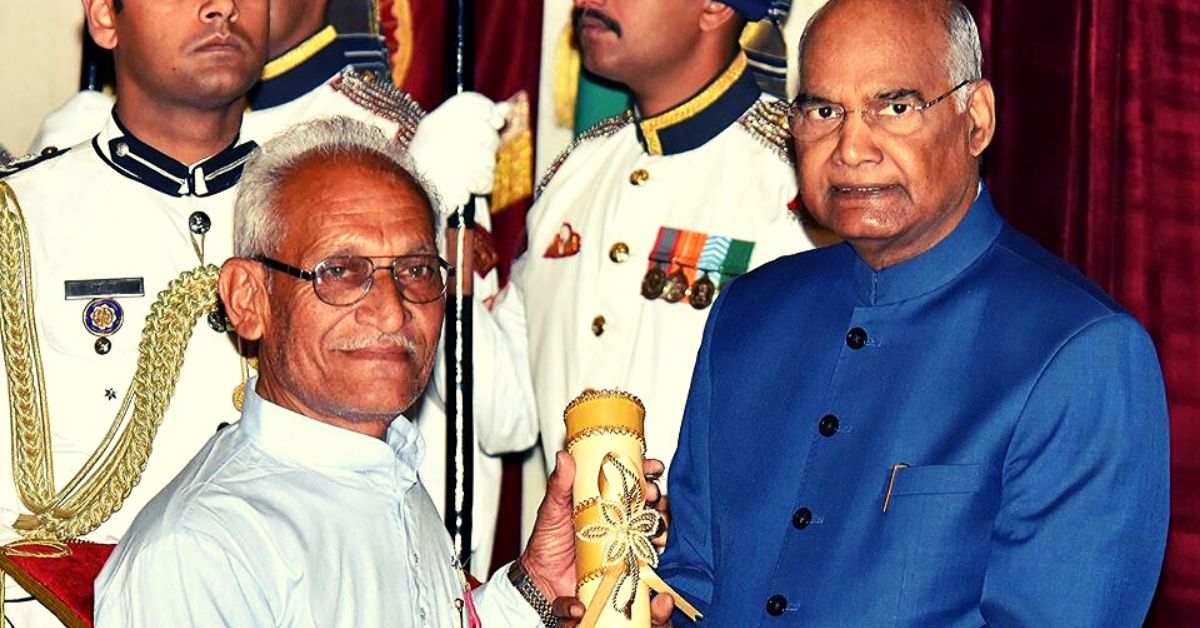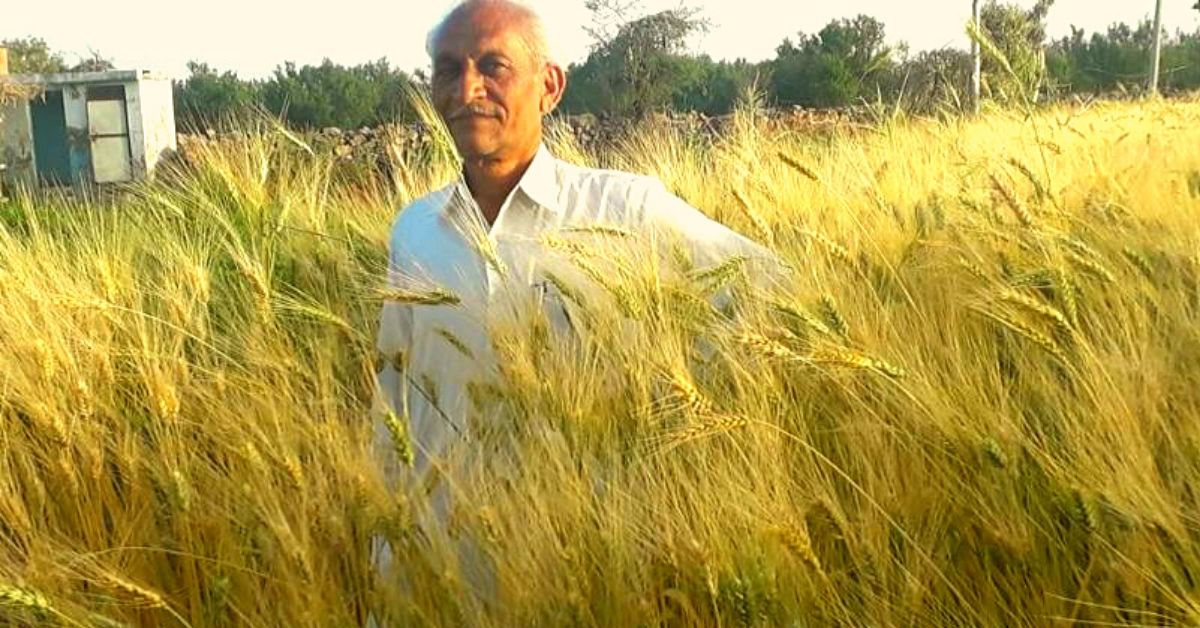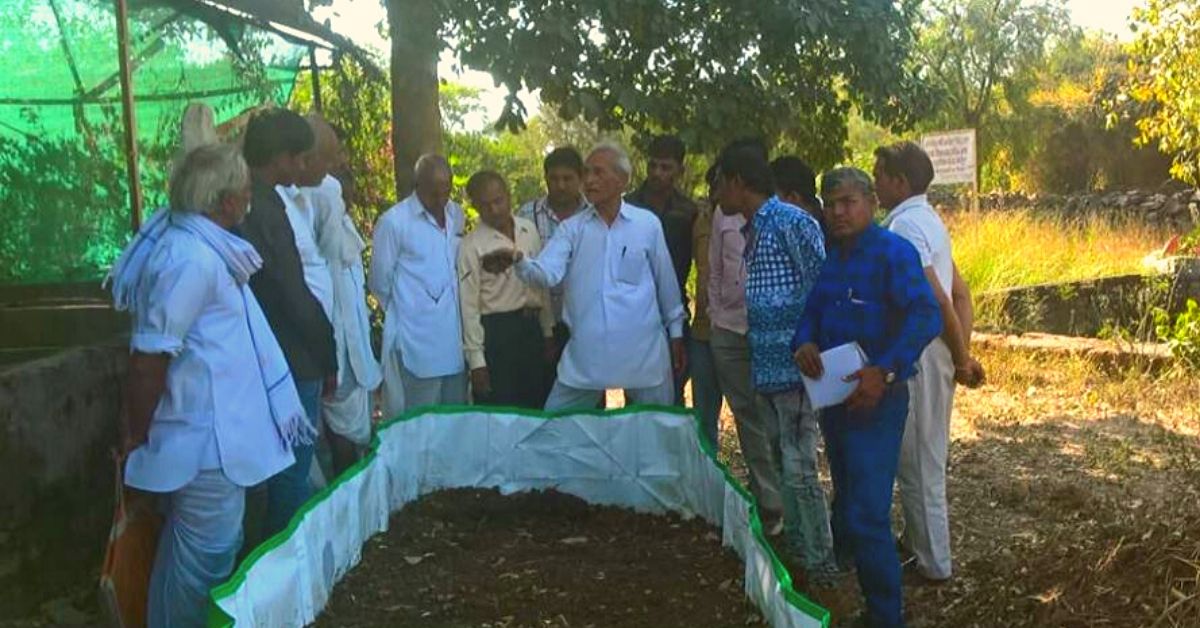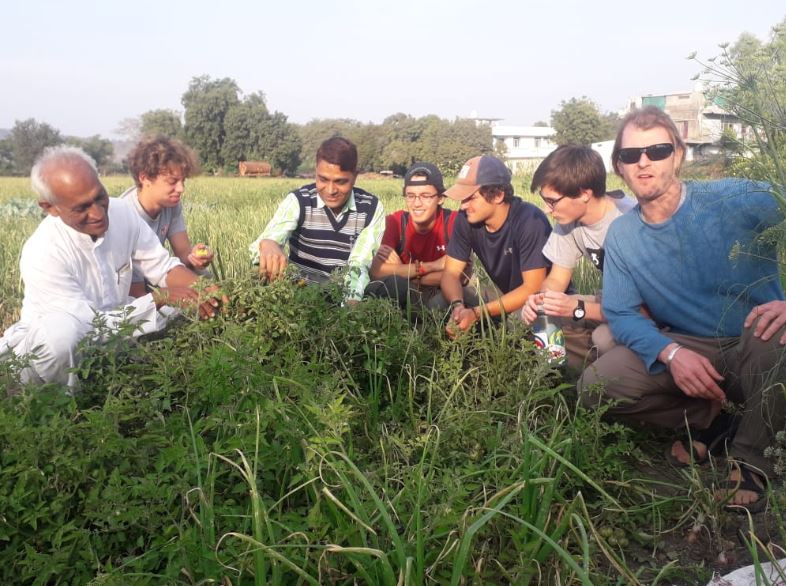Rajasthan Farmer Switches to Organic, Wins Padma Shri and Customers From 28 Nations
No harmful chemicals, no stubble burning – just pure food. And it works!

“Maine neki kiya aur dariya mein daal diya (I did a good deed and kept it to myself). Padma Shri came as a pleasant surprise. I never expected anything in return, but the prestigious award is a validation of my work,” says Hukumchand Patidar, a farmer from Manpura village, Alwar district, Rajasthan.
In March this year, Patidar travelled to Delhi to collect the award for his low-cost organic farming model. When he was coming back home he had no idea that the whole village awaited his return eagerly.
“People from around 60 villages were present on the day I returned. People from my village had hired a band that played throughout the day. My family and relatives distributed sweets to every single person in Manpura. It was nothing less than a fair,” the 62-year-old happily recalls, while speaking to The Better India.
Going against his family’s wishes, the farmer with a social conscience started practising organic farming in the half-an-acre of land his reluctant family gave him for his ‘experiments’.
His ‘experiments’, contrary to their expectations, thrived.
Now, Patidar grows pulses, fruits, and herbs like coriander, garlic organically across the entire 40-acre family land. He exports over 2,000 kilos of garlic to Switzerland, 50 tonnes of fenugreek to Germany and 100 tonnes of coriander powder to Japan.
Organic Revolution in Rajasthan
Like millions of children born in an agrarian family, Patidar’s profession too was decided right after he was born.
Till 2004, the Patidar family practised conventional farming focussing on the quantity of production. Using chemicals and pesticides to get high output every season was a part of the family’s farming tradition.
“A farmer toils hard under the sun every day to ensure no one goes hungry, and yet farmers suffer the most. Be it a farmer with a small patch of land or one with a big farm, having financial stability is everyone’s priority. So, farmers have to opt for artificial methods to beat uncertain weather conditions. We were one of them,” explains Patidar.
So why was the decade-old custom dropped?
The instances of animals like dogs and peacocks falling sick or dying upon eating local crops gradually increased to a point where cows in Patidar’s own farm fell ill.
“I was aware of organic farming and its benefits. Although, I was also under the impression that crop output is less and the time needed to invest is more. But I was also convinced to make the shift. At first, my family didn’t entertain the idea, but they finally gave in, and I was given a small patch of land to experiment with,” adds Patidar.

From Failed Experiments to A Full-Fledged Model
In the first year of harvest, Patidar’s crops got damaged, and the output was less by 10 per cent. Despite the failure, Patidar refused to use hybrid seeds and pesticides. Not giving into despair, Patidar worked on developing organic fertilisers over the next few months.
He inveigled more land from his family for the experiment. He divided his land into three sections; one each for green manure, compost and jeevamrut (fertiliser made from cow’s urine and dung).
Patidar collected 40 varieties of fallen leaves in one part and in the next part of the land he dug a pit and poured cow’s dung, urine, milk and ghee along with yoghurt, turmeric powder, and gram flour to prepare jeevamrut.
Next, he added this mixture on the collected leaves, “Adding the two initiates the fermentation process and keeps the nutrients, vitamins and carbon intact.”

Instead of sowing seeds and then adding the organic fertiliser, Patidar sowed the seeds in the fermentation site.
Meanwhile, on the final patch of land, he prepared vermicompost manure using earthworms. He sprayed the manure on the plants once the cultivation process started.
Patidar also developed a solution for stubble burning. He used the agricultural waste for mulching process, “Instead of burning the crop residue that leads to air pollution, I let it remain on the land as a surface cover during the fallow period. It prevents soil erosion from wind or water and also conserves soil moisture,” Patidar explains.
Though the yield was less the following year, he sent the output for testing to the Rajasthan State Organic Certification Agency.
The agency later granted three licenses to Patidar — National Organic Program, India, National Programme for Organic Production and Technical Standards. The three documents permit Patidar to sell his organic produce in India, USA and other countries.
Increasing the Reach of Organic Food

Patidar gradually converted the entire 40-acre land into organic farmland, and his output also increased by 120 per cent.
He credits his broad reach in the market to his two sons who introduced him to digital marketing.
“Both my sons have a degree in Computer Science, but they chose to help me. I got lucky there. They built strong networks, first domestically and then internationally,” he says.
Due to these networks, Patidar was able to create an international clientele who show immense interest in his organic model of farming. And so far, Patidar has played host to his customers from 28 countries who visit the farm to see his work.
For international customers and the ones residing in urban areas, Patidar has installed a processing unit where the vegetables are packed with a fixed price on them.
Patidar’s profits come from here.
“We sell at double the market rates to clients who can afford organic food. Our annual profits are up to Rs 20 lakh.”
Accolades and Appeal
Padma Shri is only one of the accolades Patidar has received. In the past, the Central Government implemented Patidar’s farming model in 22 villages of Jhalawar district under which close to 4,000 farmers participated.
He was even invited as a distinguished guest to the television show – Satyamev Jayate hosted by actor Aamir Khan to educate people about the harms of consuming chemical-free food.
“We need to base our actions and decisions on our future. From our health to the environment, everything around is either degrading or getting polluted. As a farmer, I have taken care of that by switching to organic farming. I have dispelled all the myths around natural farming, and my only appeal to my fellow farmers is to stop using chemicals and pesticides,” Patidar signs off.
Also Read: How to Grow a Forest Using The Miyawaki Method In Minimal Space
(Edited by Saiqua Sultan)
Like this story? Or have something to share?
Write to us: [email protected]
Connect with us on Facebook and Twitter.
If you found our stories insightful, informative, or even just enjoyable, we invite you to consider making a voluntary payment to support the work we do at The Better India. Your contribution helps us continue producing quality content that educates, inspires, and drives positive change.
Choose one of the payment options below for your contribution-
By paying for the stories you value, you directly contribute to sustaining our efforts focused on making a difference in the world. Together, let’s ensure that impactful stories continue to be told and shared, enriching lives and communities alike.
Thank you for your support. Here are some frequently asked questions you might find helpful to know why you are contributing?


This story made me
-
97
-
121
-
89
-
167













